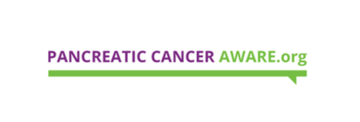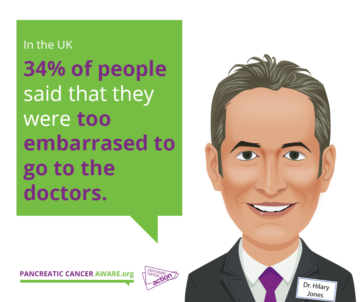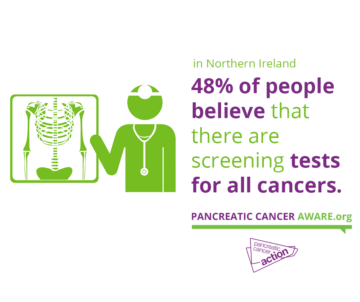Only 15% surveyed would go to hospital if they had jaundice
Our #PCAware survey in Northern Ireland has found that only 15% of people would go to A&E if they were experiencing a possible life threatening symptom of pancreatic cancer.
The survey is part of our regional #PCAware campaign and has found that only 15% of people in Northern Ireland would go to A&E if their skin was turning yellow and itchy (jaundice), and a further 17% would wait to see if it went away without any medical treatment.
 In comparison, 94% of people would seek medical help for classic symptoms of cancers such as a lump.
In comparison, 94% of people would seek medical help for classic symptoms of cancers such as a lump.
Jaundice can be a serious symptom of pancreatic cancer, liver cancer and bile duct cancer. It is often the symptom of either severe or advanced conditions such as liver disease or cancer. It is not an early stage symptom, so it is vital to get it checked urgently.
Becky Rice, Health Information Officer at Pancreatic Cancer Action says, “It is shocking that such few people would go to A&E if they were experiencing yellowing of the skin and the eyes and itching of the skin.”
“It is vital to seek urgent medical help, such as going to A&E, if you have jaundice. Even if the cause is not cancer, the conditions that can cause jaundice are serious and need to be treated.”

Other statistics from the survey
 The survey also revealed that 60% of people in Northern Ireland had heard of pancreatic cancer but knew nothing about the symptoms and 2% of people have never even heard of pancreatic cancer.
The survey also revealed that 60% of people in Northern Ireland had heard of pancreatic cancer but knew nothing about the symptoms and 2% of people have never even heard of pancreatic cancer.
We’re working in partnership with local group Northern Ireland Pancreatic Cancer (NIPanC) to increase awareness of pancreatic cancer and break down the barriers that are preventing people from being diagnosed early.
For example, 34% of people being too embarrassed to see the doctor and 37% of people worrying what the doctor might find.
Dr Hilary Jones, GP patron of PCA, says, “You should never be embarrassed to go to the GP with symptoms you have and it’s important to always get them checked. We’ve seen our fair share of symptoms throughout our careers as GPs and expect to see lots more – it’s what we do!”
There is no screening test currently available for pancreatic cancer, which is why it is so vital to be aware of the associated signs and symptoms. Worryingly, 48% of people surveyed believed that there were screening tests for all cancers.
What’s more, 89% of people surveyed believed that cancer survival rates for all cancer have significantly improved in the last 40 years. Yet pancreatic cancer survival rates have barely changed over that time – with only 7% of patients surviving for 5 years.

We’ve launched #PCAware, a symptom awareness campaign across Northern Ireland to educate the public, GP’s and pharmacists. We are placing symptom adverts across the region and providing free resource packs to pharmacy teams and GPs, which include free e-learning on pancreatic cancer.
Ultimately, as a charity we hope to increase awareness of pancreatic cancer and improve the shocking survival rate, through earlier diagnosis of the disease.
If members of the public would like to find out how to raise further awareness or donate, please visit: www.panact.org/pcaware-donate.
If you are a healthcare professional and would like to find out about the free resources that Pancreatic Cancer Action are providing, visit their new healthcare section of the website here: www.pancreaticcanceraction.org/healthcare-professionals/
For details about Northern Ireland Pancreatic Cancer, a supporter of Pancreatic Cancer Action and Pancreatic Cancer Research Fund, please visit www.nipanc.org.